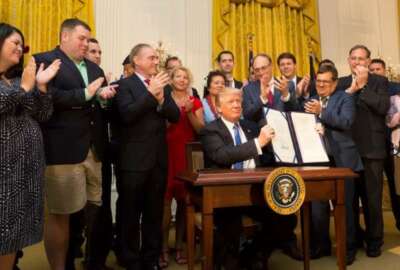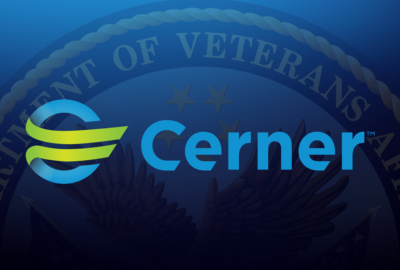

The president's nominees for the Veterans Affairs Department's chief information officer and accountability and whistleblower protection director promised they...
Best listening experience is on Chrome, Firefox or Safari. Subscribe to Federal Drive’s daily audio interviews on Apple Podcasts or PodcastOne.
More than four years after a wait time scandal rocked the agency and decimated trust among veterans, employees and members of Congress, the Veterans Affairs Department still suffers from a “trust deficit.”
So say members of the Senate VA Committee, which, in the days and hours leading up to Wednesday’s nomination hearing for two top-level leaders, said they felt blindsided by the department, which didn’t proactively inform them of new challenges with the GI bill and a surprising report on VA vacancies.
“It’s time that we stop having a VA that causes its own problems,” Senate VA Chairman Johnny Isakson (R-Ga.) said.
The president’s nominees for VA chief information officer and accountability and whistleblower protection director vowed to communicate with Congress and promised to help Secretary Robert Wilkie jump-start a serious culture change at the department.
If confirmed, these nominees will manage two of the more beleaguered entities at the VA, senators said.
Both nominees have enormous tasks ahead of them.
James Gfrerer, the president’s nominee to be VA’s permanent assistant secretary for information and technology, will be in charge of overseeing and implementing the department’s electronic health record modernization, the biggest IT transformation in government history.
VA hasn’t had a permanent CIO in more than 18 months, and earlier in August, it lost two of its top executives leading the agency’s electronic health record modernization. The new chairman of the House VA subcommittee on technology modernization recently expressed his concerns over VA’s “rudderless leadership” on the EHR project.
Senators are concerned too.
“We need to get it done, but what’s even more important is that it has to be done right,” Senate VA Committee Ranking Member Jon Tester (D-Mont.) said. “If there’s anything we learned from [VA] Choice is we pushed it and it ended up being a train wreck. This is really going to make or break VA going forward.”
Gfrerer acknowledged VA’s tendency to fall behind and over budget on past IT projects. He said it’s easy to see how, with a 10-year timeline for VA’s EHR modernization efforts, the agency could push back early milestones.
“There is every sense of urgency to make that timeline under 10 years, not to push it at or beyond 10,” Gfrerer said.
Gfrefer said he met with executives at each of the VA’s administrative arms, along with career leaders in the Office of Information and Technology and the agency’s new Electronic Health Record Modernization Office. He’s planning to measure progress on VA IT initiatives through measurable outcomes.
“To measure progress, my intent would be to use a road map with a comprehensive, balanced scorecard for these broad goals and objectives, supporting core internal customers and map to their projects,” Gfrerer said.
Tamara Bonzanto, the president’s nominee to lead the new Office of Accountability and Whistleblower Protection (OAWP), faces another difficult task.
After more than a year under the new Accountability and Whistleblower Protection Act, VA employees still view the new office with a sense of distrust. VA employees have also said that under new performance standards, they fear one mistake will cost them their jobs.
And an independent arbitrator recently ruled that VA didn’t fairly use the accountability act to discipline employees for poor performance.
“This is no easy task,” Tester said. “We are living in a time when accountability has become shorthand for firing and when whistleblowers in the VA make up more of the Office of Special Counsel’s workload than any other agency.”
Bonzanto is a Navy veteran, a nurse and a health care investigator for the House Veterans Affairs Subcommittee on Oversight and Investigation.
It’s that experience that has taught her that VA has the potential to improve communication, employee engagement, build trust, enhance advocacy and improve transparency with employees and veterans, Bonzanto said.
“My fellow veterans deserve a health care and benefits system where there’s trust, advocacy, transparency and accountability,” she said. “Every era of veterans has struggled at some point to access services within VA. I do not want history to keep repeating itself. We need to change our approach to serving veterans, and I see this office as a catalyst for changing the culture in the VA.”
Bonzanto said she would evaluate the strengths and weaknesses of the new accountability office. Supervisors currently don’t know how to handle the information they receive from their employees, she said. Information isn’t spreading up the chain of command, and it isn’t trickling down the chain of command, either.
“When employees report an issue, they [should] trust that the chain of command will take care of that issue, and currently that’s not happening,” Bonzanto said. “I’m hoping a year from now, we can start reducing the number of whistleblowers coming to our office and reporting concerns.”
Changing VA’s culture won’t happen unless the department builds trust with its employees, Bonzanto said. And VA also needs a new approach in responding to whistleblowers, she added.
“I do not believe that at the local level there’s trust that the local leadership will do the right thing when it comes to whistleblowers,” Bonzanto said. “We’ve seen many whistleblowers and we’ve had many complaints in my experience of whistleblowers being retaliated against. Currently the way the office is structured, the reports of retaliation get referred back at the local level for investigation. I do not believe that’s appropriate, because the culture in VA does not support that right now.”
Both Isakson and Tester seemed encouraged by Gfrerer and Bonzanto’s plans.
“Ms. Bonzanto, I hope you do as you say, and I have no reason to think that you won’t,” Tester said.
Copyright © 2025 Federal News Network. All rights reserved. This website is not intended for users located within the European Economic Area.
Nicole Ogrysko is a reporter for Federal News Network focusing on the federal workforce and federal pay and benefits.
Follow @nogryskoWFED

 Exclusive
Exclusive 

